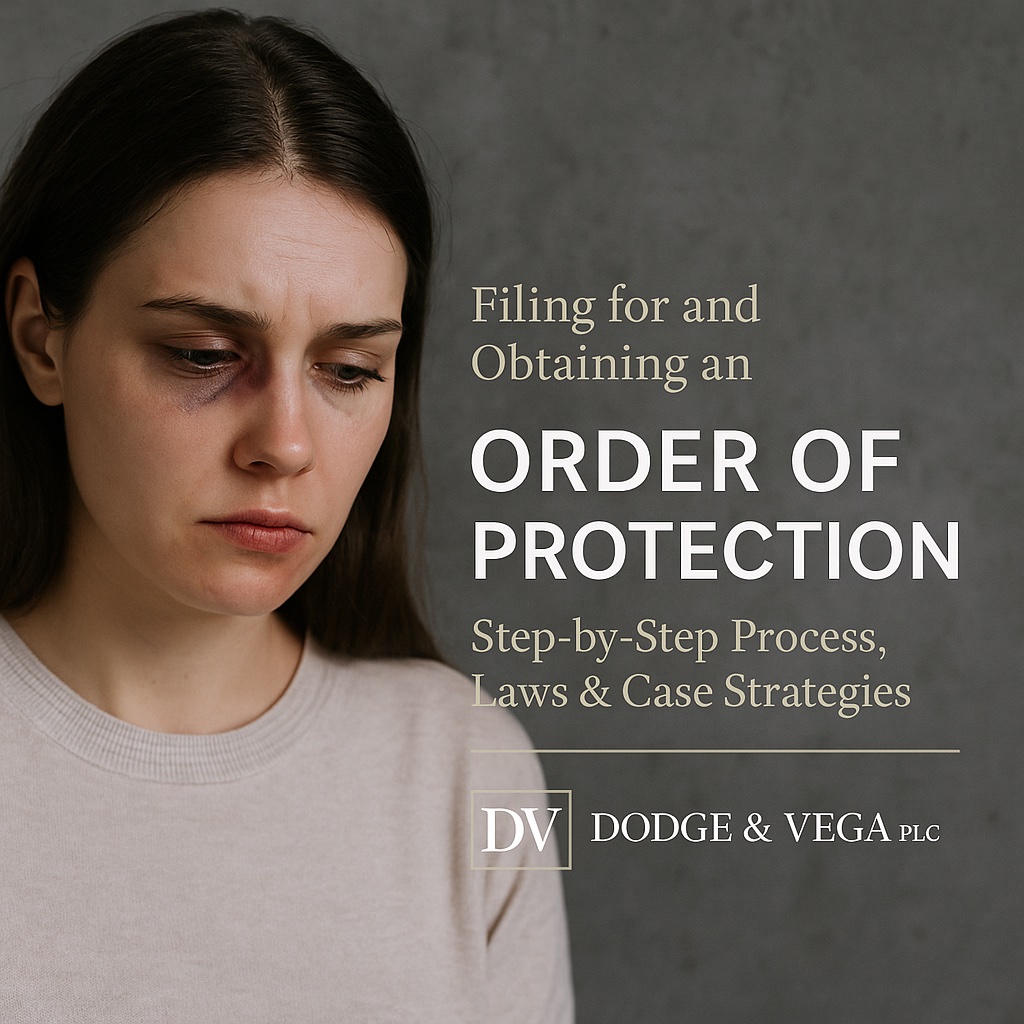Understanding Orders of Protection in Arizona
An Order of Protection is a civil court order designed to shield individuals from domestic violence. It may be issued by municipal, justice, or superior courts across Arizona, regardless of where the plaintiff or defendant lives.(azleg.gov)
Arizona law defines “domestic violence” under A.R.S. § 13-3601(A) and establishes the process for obtaining an OP through A.R.S. § 13-3602.(womenslaw.org)
Step-by-Step Process
1. Filing the Petition
- Who can file: Any adult harmed by someone they have a qualifying relationship with. If the victim is a minor, a parent, guardian, or legal custodian must file. In cases where the victim is incapacitated, a third party can petition, subject to court approval.(azleg.gov)
- Where to file: At any municipal, justice, or superior court as long as no overlapping family law case exists. If such a case (divorce, custody, etc.) exists, filing must happen in superior court.(law.arizona.edu)
- Tools available: The AZPOINT tool offers guided assistance in filling out forms, free of charge.(superiorcourt.maricopa.gov)
2. Ex Parte Hearing
- The court may issue an ex parte Order of Protection if there’s reasonable cause to believe the defendant has committed or may commit domestic violence.
- Relief options may include:
- No-contact provisions
- Exclusive use of the residence
- Prohibiting defendant from certain locations (home, work, school)
- Firearm restrictions and surrender of weapons
- Care for pets
- Other protections deemed appropriate
3. Emergency Order of Protection (EOP)
- Granted after hours by phone or in person when courts are closed. Law enforcement or a judicial officer with reasonable cause can issue an oral or written EOP.
- It lasts seven days unless extended and includes similar protections as a standard OP.
4. Service and Effectiveness
- An OP is only effective once served. Service is completed by law enforcement—municipal or county—depending on the issuing court.
- No fee is required for filing or service if handled by a court-contracted agency.
- If the defendant isn’t served within 15 days, law enforcement must notify the petitioner.
5. Duration and Hearings
- Duration:
- Orders served after September 24, 2022 remain in effect for two years from the service date.
- Orders served before that date last one year.
- The defendant may request a hearing within the order’s duration. This hearing must occur within 5–10 business days, or within 5 days if the order grants exclusive use of the home.
6. Modification, Dismissal, or Renewal
- A plaintiff or defendant may file a motion to modify or dismiss (“quash”) the order at any time. Only a judge can grant such requests.
- If the original OP is part of a divorce or similar proceeding, a family court has authority to modify terms—particularly regarding parenting time, if it is not harmful to the child.
7. Transfer to Superior Court (Divorce-Linked Cases)
- If an OP is issued in a justice or municipal court and a divorce or related case is filed, the OP file must be transferred to superior court. There, the OP is handled as though originally filed there.
- Per McCarthy v. McCarthy, an OP consolidated with divorce proceedings cannot be appealed until the divorce case is final due to family law procedural rules.

Key Statutes & Rules at a Glance
| Statute / Rule | Summary |
|---|---|
| A.R.S. § 13-3601(A) | Defines domestic violence for OP purposes. |
| A.R.S. § 13-3602 | Governs Orders of Protection: filing, contents, service, duration. |
| A.R.S. § 13-3624 | Emergency Order of Protection process and duration. |
| Arizona Rules of Protective Order Procedure | Procedural rules augmenting statutes; ex parte hearings, service, fees. |
| A.R.S. § 13-3602(P) | Transfer requirement when OP overlaps with family law case. |
| Case law — McCarthy v. McCarthy | Appeals of OPs consolidated with divorce aren’t timely until finality. |
| Case law — Courtney v. Superior Court | Superior court may modify OP to accommodate safe parenting time. |
Why You Need Experienced Legal Help
While the law provides a clear framework for obtaining an Order of Protection, the reality inside the courtroom is far more complex. Judges weigh credibility, evidence, and statutory requirements — but mistakes in filing, missing key facts, or failing to respond to challenges from the other party can put your safety or your parental rights at risk.
- If you’re the petitioner, you need to present a strong, persuasive case backed by facts that satisfy the court’s legal standards.
- If you’re the respondent, your rights, your home, your children, and even your firearms may be on the line. Mishandling the defense of an OP could have serious, lasting consequences.
This is where experienced trial lawyers make the difference. At Dodge & Vega PLC – Family Law Trial Lawyers, we know Arizona’s protective order statutes, procedures, and case law inside and out. We don’t just file papers — we fight to ensure your safety, your rights, and your future are fully protected.
Don’t go into this process alone. Whether you need protection or are defending yourself against an OP, you deserve seasoned legal advocates who understand the battlefield of Arizona family law.
Contact Dodge & Vega PLC today. Let us stand with you, fight for you, and guide you through every step of the process.
📞 Click here to schedule your consult
⚖️ Real trial lawyers. Real results.
-Ben Dodge, Esq.,
Founder – Managing Partner, Trial Attorney

Founder – Managing Partner, Trial Attorney
Dodge & Vega Trial Law Practice Areas: